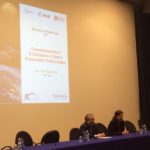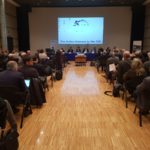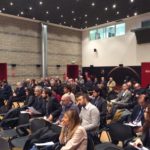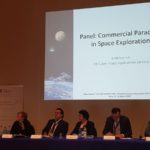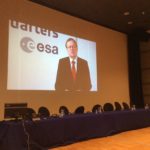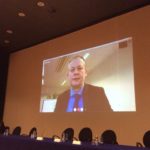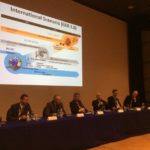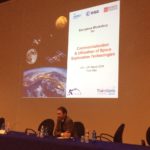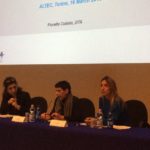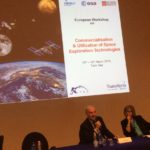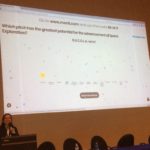Over 70 participants attended the Workshop on “Commercialization and Utilization of Space Exploration Technologies“, co-organized by NEREUS, Piedmont Region, and ESA and hosted at ALTEC – The Italian Gateway to the International Space Station. The goal was to identify successful business ideas and innovative concepts demonstrating the benefits of the utilization, direct commercialization and indirect exploitation of space exploration outcomes. Following a successful Call for Abstracts, 20 selected ideas were presented to an audience of industry players, European institutions, national space agencies and other interested stakeholders. The business ideas set the frame of the discussions, which looked into how the shift of paradigm known as Space 4.0 is impacting the Space Exploration sector and in particular the potential for the commercialization of technologies related to the field.
The main key points of the discussion are that:
- Space 4.0 in space exploration is on track: ICECUBE is in place, and Bartolomeo will be available soon; in perspective a commercial lunar lander is envisaged, implying a commercial-based logistics and telecommunication to/from ground;
- Space 4.0 in space exploration means both commercialization and cross-fertilization (spin-in/off), stimulating economic expansion also on the ground;
- In this context, ESA can act as an anchor tenant, and enabler/facilitator thanks to specific actions put in place: call for ideas on commercial partnerships; establishment of BICs in Europe; space Exploration masters, and grand challenges (prizes); shaping of space industrial policy to stimulate a market approach; efforts to link and integrate space and non-space actors around a common goal;
- Most probably the opening to commercialization will imply worldwide competition for European entities, thus increase of risks. However, it will also imply lower costs and so democratization of space.
- When it comes to commercial endeavors, the landscape in Europe is not so advanced as in the USA, where there are billionaires willing to fund space and exploration, and where, consequently, the competition is very tough. However, in Europe, the process is started.
- The crucial role of Regions and the public sector was broadly recognized: public investment in the space sector has been and remains fundamental at both ends of the space economy value chain – as support to research and development activities as well as to stimulate the development of value-added services and entrepreneurship via the commercialization of space exploration outcomes. Once again, the American role of the public sector was distinguished from the European one, as the latter is challenged in the definition of the interplay with the industry players.
- The role of Regions was particularly highlighted when it comes to supporting initiatives that have a strategic impact on territories and/or rely on the political role of regional mediation. For example, the positioning of a region as Italian Space Port, or hosting the Leicester Space Parks requires an active involvement of regional authorities in terms of political support, technical backing and – in some cases – public investment. The pluriannual activities led by Piedmont region are, in this respect, exemplary.
Interesting links mentioned during the conference:
- Seraphim Capital – invests in companies that are transforming global industries through the generation, enhancement and application of satellite and drone enabled data.
- Funder Nation – enables private investors to invest directly and professionally in promising companies.
- Space Exploration Masters – empowers and fosters innovation through new ideas for LEO, Moon, Mars, and Earth.
- Italian Strategic Plan on Space Economy (Italian)
- Regional Contribution to the Italian Strategic Plan on Space Economy (Italian)
- Piedmont Region’s contribution to the Italian Strategic Plan on Space Economy (Italian)
Technical pitches Sessions:
The European Space Agency managed the selection of the 3 best ideas on Day 1 and Day 2, using Mentimeter – an interactive tool enabling the audience to participate in the voting process. The outcomes of the selection are as follows:
Day 1 – Check the Mentimeter Award Visualization
- The greatest potential for the advancement of Space Exploration: R.U.C.O.L.A.
- The greatest market potential: Anti-bacteria fabric for clothes + PIUME
- The highest value for regional ecosystems: PIUME
Day 2 – Check the Mentimeter Award Visualization
- The greatest potential for the advancement of Space Exploration: Electric Propulsion
- The greatest market potential: Hyplane
- The highest value for regional ecosystems: Space Rider

